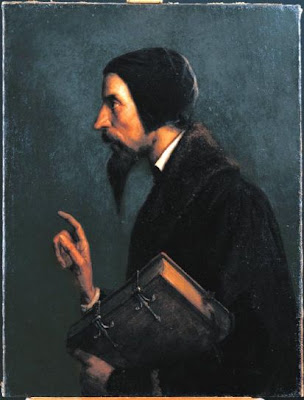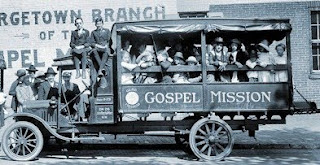 In the months leading up to 10 July 2009, any casual reader of Christian blogs would have had to have typed the keywords 'Calvin' and '500' into their parental control software to not know that John Calvin’s 500th birthday was approaching.
In the months leading up to 10 July 2009, any casual reader of Christian blogs would have had to have typed the keywords 'Calvin' and '500' into their parental control software to not know that John Calvin’s 500th birthday was approaching.
500 years on, Calvin is still read, argued over and often vilified.
Yes, Calvin’s Institutes of the Christian Religion still stands up today as arguably the summary of the biblical Christian faith. Yes, he was a reformer of enormous influence – in the church, in civics and in science. But, I hear you say, wasn’t Calvin a harsh, authoritarian pointy‑head with a pointy beard? Wasn’t he, according to the Oxford Dictionary of the Christian Church, the ‘unopposed dictator of Geneva’? And wasn’t he the champion of the doctrine of predestination, which led to the emergence of the movement that stopped doing evangelism (often labelled ‘hyper‑Calvinism)?
Calvin evokes powerful images, most of these negative.
 So given the online excitement about his 500th, I made it my personal project as a 20‑something, mere layperson to meet the man behind the stigma. I started by reading a number of papers and journal articles.
So given the online excitement about his 500th, I made it my personal project as a 20‑something, mere layperson to meet the man behind the stigma. I started by reading a number of papers and journal articles.
Then, at about the same time I discovered online shopping. So the first thing I did was to buy the Institutes. To accompany the Institutes, I bought a book called John Calvin: A heart for devotion, doctrine & doxology – based on endorsements from two of my favourite authors D A Carson and David F Wells.
A heart for devotion, doctrine & doxology gives an overview of the life, work and teaching of Calvin. Pitched at the ordinary reader, it consists of 19 short essays by a mainly North American all-star cast of scholars and pastors. Far from being dry, the book set out to capture the heart of Calvin through his life and his writings. The book can be broadly split into two parts.
Calvin's life and work
The first half of the book (chapters two to eight) is about Calvin’s life and work. The picture portrayed is that of a reformer, churchman, preacher, counsellor and prolific writer who made a difference. While it has been widely argued that Calvin played a pivotal role in transforming western society, his deepest imperative was to transform believers to conform their lives and minds to Scripture.
 To this end he worked tirelessly, motivated by a single-minded service to the biblical God. Calvin’s motto Cor meum tibi offero Domine prompte et sincere was genuine. Freely translated, the motto reads: 'My heart for your cause I offer, my Lord, promptly and sincerely.'
To this end he worked tirelessly, motivated by a single-minded service to the biblical God. Calvin’s motto Cor meum tibi offero Domine prompte et sincere was genuine. Freely translated, the motto reads: 'My heart for your cause I offer, my Lord, promptly and sincerely.'
For this cause, Calvin worked himself at a self‑destructing rate. Stories of him lecturing students from his deathbed and working through the pain of a stone in the urinary tract the size of a hazelnut are legendary. When he was seriously ill and confined to bed, his friends urged him to rest, but he replied, “Would you that the Lord, when He comes, find me idle?” He is also portrayed as a man gifted with a pastoral heart. Excerpts from his letter consoling a grieving father were particularly moving, powerfully demonstrating that doctrine and love were inseparable.
One thing about his ministry particularly stood out for me. Rather than stifling evangelism, Calvin’s ministry inspired generations of evangelists and apologists. He set up schools in Geneva which trained up legions of pastor and evangelists.
Many of these workers subsequently returned to France and were persecuted and martyred. Many of them were killed in the massacres of St Bartholomew’s Day in 1572, where Protestants in France were targeted and slaughtered following the assassination of the French Calvinist political leadership. The death toll relating to these massacres has been estimated at around 3000 in the provinces and 2000-4000 in Paris[1], although there are claims that these estimates are conservative.
 Further, many of the great evangelists in the centuries to follow were avowed Calvinists. Just for starters, think Spurgeon, George Whitefield and Jonathan Edwards. The heroes of the faith that I have admired from my formative years — Messrs Jensen, Packer and Carson — all teach with a heavy ‘Reformed’ flavour (in the Calvin sense of the word).
Further, many of the great evangelists in the centuries to follow were avowed Calvinists. Just for starters, think Spurgeon, George Whitefield and Jonathan Edwards. The heroes of the faith that I have admired from my formative years — Messrs Jensen, Packer and Carson — all teach with a heavy ‘Reformed’ flavour (in the Calvin sense of the word).
Two observations about his teaching
The second part of the book seeks to grapple with his key teachings – drawing extensively from the Institutes and his commentaries. This section starts with one essay on Christ as the supreme King, Prophet and Priest followed by one on the work of the Spirit. Then there are five chapters that correspond to the ‘five points’: Man’s Radical Corruption, Election and Reprobation, Redemption Defined, Transforming Grace, and A Certain Inheritance. Finishing up are chapters on our union with Christ, justification, Christian life, and prayer.
The first thing that was immediately apparent was that Calvin’s work was far richer than the ‘five points’, often represented by the TULIP acronym. The five points, while attributed to Calvin, was not a doctrine summary championed by Calvin himself. As such, to focus solely on the five points oversimplifies Calvin, wherever you may stand on the five-point spectrum. As the author of chapter one puts it, ever the diplomat, ‘there are many self-proclaimed Calvinists whose Calvinism runs no deeper than the five points’: They have perhaps found themselves prancing gleefully amid a valley of bright red tulips, but have not lifted their heads to behold the lush green forests and glorious mountains all around them. (p4)
 The second observation was that Calvin was wholly and fundamentally established in the Scriptures. His imperative was not to, in technical terms, ‘make stuff up’.
The second observation was that Calvin was wholly and fundamentally established in the Scriptures. His imperative was not to, in technical terms, ‘make stuff up’.
As James Montgomery Boice points out, ‘Calvin had no weapon but the Bible’. Unlike many today, Calvin did not use the pulpit or his writings as a platform to unload a captivating story, a personal inspiration or his most recent liver shiver. Rather, consistent with the Reformation war-cry ad fontes (‘to the sources’), he urges:
Let us not take it into our heads either to seek out God anywhere else than his Sacred Word, or to think anything of him that is not prompted by his Word, or to speak anything that is not taken from that Word. (Institutes 1.13.21)
The foundation of Calvin’s 'Calvinism' was threefold: the heart’s devotion to the biblical God, the mind’s pursuit of the biblical doctrine of God, and the entire being’s surrender to the praise of the biblical God. Calvin’s legacy was a Bible-shaped pattern of thinking that inevitably led to a Christ-centred, Spirit‑armed, God-hungering, gospel‑driven life.
 A heart for devotion, doctrine & doxology was a refreshing and enjoyable read. I was struck by the humility of the man and it motivated me to read more of his writings. However, I found the endnotes at the end of each chapter annoying (one chapter had more than 100). I would have preferred footnotes. Also, I would have liked to have seen the book do more to critique the parts of Calvin’s writings which, with the benefit of hindsight, showed his weaknesses – in particular his polarisations and intolerances about some of his contemporaries.
A heart for devotion, doctrine & doxology was a refreshing and enjoyable read. I was struck by the humility of the man and it motivated me to read more of his writings. However, I found the endnotes at the end of each chapter annoying (one chapter had more than 100). I would have preferred footnotes. Also, I would have liked to have seen the book do more to critique the parts of Calvin’s writings which, with the benefit of hindsight, showed his weaknesses – in particular his polarisations and intolerances about some of his contemporaries. What are we to make of Calvin on his 500th birthday?
Whatever you might think of Calvin let me suggest that you follow the Reformation war cry – ‘to the sources!’ Be very careful reacting to cardboard cutouts. Download the Institutes. Buy the book. Either way, get it from the horse’s mouth. As JI Packer put it, ‘the amount of misrepresentation to which Calvin’s theology has been subjected has been enough to prove his doctrine of total depravity several times over!’ Rather than responding to the caricature, read Calvin for yourself and apply the biblical blowtorch. I know Calvin would have.
In him
Tim Wong
[1] Tulchin A (2006) ‘The Michelade in Nîmes, 1567’, French Historical Studies, 29(1); Knecht RJ (1996) The Rise and Fall of Renaissance France, 366






